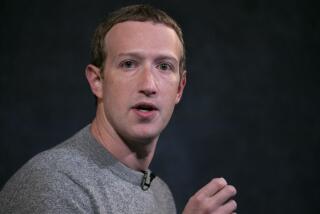Winklevoss twins plan new appeal
- Share via
SAN FRANCISCO — The Winklevoss twins are not giving up on their efforts to claim a bigger stake of Facebook.
Cameron and Tyler Winklevoss, who allege that former Harvard University schoolmate Mark Zuckerberg stole their idea for the social networking site, told a federal judge in Boston on Wednesday that they planned to ask for a court inquiry into claims that Facebook and its lawyers hid instant messages from them during litigation.
Without knowledge of those messages, the brothers said, they settled their differences with the Facebook chief executive three years ago for $65 million in cash and stock -- far less than they otherwise would have agreed on.
The request was the second effort this week by the twins to overturn the settlement and allow them to proceed to trial on their theft claims. In a separate case in California, they asked the U.S. 9th Circuit Court of Appeals to reconsider last week’s order keeping the settlement intact.
The champion rowers, who competed in the Beijing Olympics and whose legal spat with Zuckerberg was dramatized in the hit film “The Social Network,” contend that Facebook hoodwinked them during seven years of litigation. The 2008 settlement consisted of $20 million in cash and Facebook shares originally valued at $45 million. Those shares now are worth more than $200 million by some estimates.
At issue are a series of instant messages that Zuckerberg sent while at Harvard and that were leaked to two media outlets last year.
The Winklevosses said Facebook did not turn over the messages during discovery, raising a serious issue of whether the plaintiffs were deprived of “critical evidence,” according to a report the Winklevosses filed Wednesday in the Boston case.
A Facebook spokesman said “we consider the matter concluded.”
In an interview with The Times in February, the Winklevosses accused Facebook of stonewalling them for more than two years in a document tug of war.
“We had a great case. We just didn’t have all the evidence,” Cameron Winklevoss said.
The Winklevosses declined to comment Wednesday. Their attorney, Tyler Meade, said that “these developments should be examined.”
Legal experts said the Winklevosses face a tough battle in trying to persuade the courts to overturn the settlement, even if they prove that Facebook violated discovery procedures.
The Winklevosses gave up all claims -- even the ones they didn’t know about -- when they entered into the agreement, said UC Berkeley law professor Robert Bartlett, citing the 9th Circuit opinion.
“It sounds very much like a Hail Mary,” Bartlett said.
The litigation surrounding the origins of Facebook has clouded one of the Internet’s brightest success stories. Over the last seven years, Zuckerberg has built Facebook into one of the planet’s most popular social networking sites and one of the Internet’s most powerful companies.
In January, New York investment bank Goldman Sachs Group Inc. invested $450 million in Facebook, boosting the Palo Alto company’s valuation to $50 billion. And Facebook shares are hotly traded on private exchanges, building anticipation for an initial public offering that could come as early as next year.
Legal experts say Facebook will try to clear up its legal troubles before then.
The dispute with the Winklevosses stretches back to the launch of Facebook in 2004, when Zuckerberg and the twins were students at Harvard.
The Winklevosses and a partner, Divya Narendra, hired Zuckerberg to help build their social networking site ConnectU in 2003. Instead, they said, Zuckerberg delayed their project while secretly building his own. They sued Zuckerberg and Facebook in September 2004. Facebook countersued in 2005, alleging that ConnectU hacked into its user database to swipe e-mail addresses.
The instant messages in question reportedly were uncovered by Facebook’s legal team when it searched Zuckerberg’s computer to prepare for the litigation.
In 2010, some of the instant messages were leaked to the news site Silicon Alley Insider. They also were mentioned in a lengthy profile of Zuckerberg in the New Yorker magazine for which he cooperated right before the October release of “The Social Network.”
In one instant message exchange, Zuckerberg outlined to a friend what he planned to do about Harvard Connect, then the name of the Winklevosses’ website. “I’m going to [expletive] them,” he wrote. In another, he said of the Winklevosses: “They made a mistake haha. They asked me to make it for them. So I’m like delaying it so it won’t be ready until after the Facebook thing comes out.”
U.S. District Judge Douglas Woodlock in Boston refused to examine the messages and speculated that the Winklevosses were suffering from a case of “buyer’s remorse” over the settlement. In June 2008, U.S. District Judge James Ware in San Jose also sided with Facebook and enforced the settlement.
--






